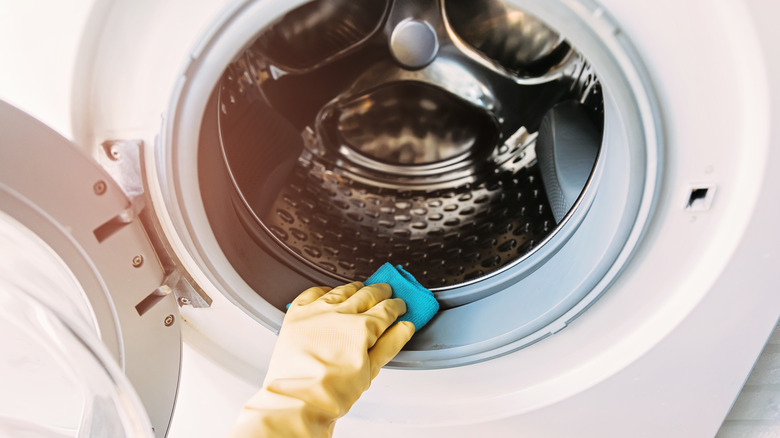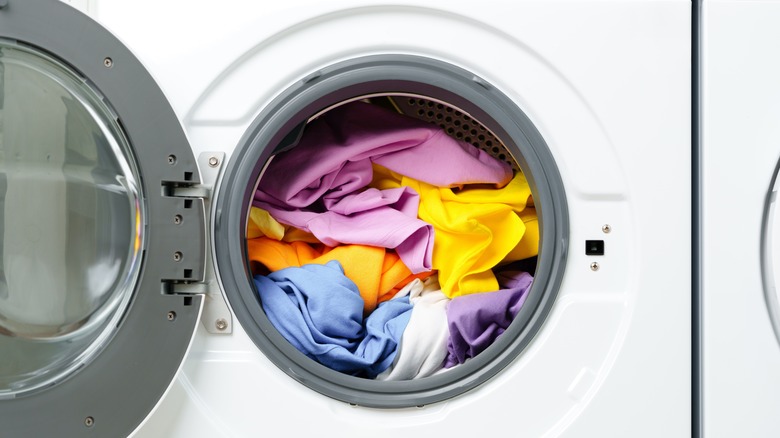Why Your Laundry Smells Sour Right Out Of The Wash (And What To Do About It)
For many people, there's nothing like clean-smelling laundry, so much the global market for laundry scent boosters has a projected growth of $628.4 million to 2029, according to Market Data Forecast. Whether you like your laundry with a natural clean scent or infused with a laundry scent booster, there's no mistaking how disappointing it is when you remove your laundry only to discover it smells sour. The reasons why your laundry smells sour can include the condition of your washing machine, how much detergent you use, and trapped bacteria in your clothing.
Sour-smelling laundry isn't just unpleasant. If the smell is due to bacteria in your washing machine, this can pose a health risk. Bacteria such as staph and E. coli can linger in the washer and fabrics for weeks increasing your chances of developing an infection. Breathing in mold and mildew from your laundry can aggravate your breathing and cause allergic symptoms. Simply rewashing your clothing might not fix the problem, especially if the cause is any of the following issues, common culprits to less-than-fresh laundry.
Your washing machine and other aspects of sour-smelling laundry
It might not be obvious, but you need to clean your washing machine! Regardless of the fact a washing machine constantly has suds and water, it needs regular cleaning for the best performance. If you have a fairly new washer, you may have a model with a "self-cleaning" setting. If not, however, you need to clean your washing machine thoroughly to remove any source of bacteria, mold, and mildew. Experts recommend cleaning your washer at least once a month to avoid bacterial buildup. Luckily, there are multiple hacks to help keep your washing machine sparkly clean, including running a hot cycle with distilled white vinegar in your detergent cup. Don't forget to clean around the washer door's seal to remove any gunk that may disperse into your clothes.
Sometimes your washing machine isn't the primary culprit, it's your detergent usage. Using the wrong amount of soap, poor-quality detergent, or a detergent not suitable for a high-efficiency washer can lead to residue buildup which encourages bacterial growth. It's best to use a standard amount of 1 ½ oz of detergent for a normal-sized load of laundry, and then double that for large or heavily soiled loads. Always check if you're using the proper amount of detergent or the right kind for your machine to avoid residue on your clothes. If you still can't get the buildup off your clothes after washing, consider switching to a different detergent to see if that helps.
Damp clothes and overloaded washing machines can contribute to sour laundry
You can avoid sour-smelling laundry by ensuring you don't let your wet laundry sit in the washing machine too long before you remove it to hang or tumble dry. For front-loading washing machines, you should prop open the door to encourage airflow and let the washing machine dry to get rid of any remaining moisture. Simply using too much of a common laundry staple, fabric softener, can also lead to mold in the washing machine, so consider stopping its use if nothing else works.
You might also be doing something everyone can get wrong when doing laundry, trying to wash too big of a load for the washer. An oversized load makes it harder for the water to properly rinse away the detergent or drain. The clothes may not fully cycle as well if you cram too much in your washing machine, and you could even damage the motor if you continue overloading the appliance.


